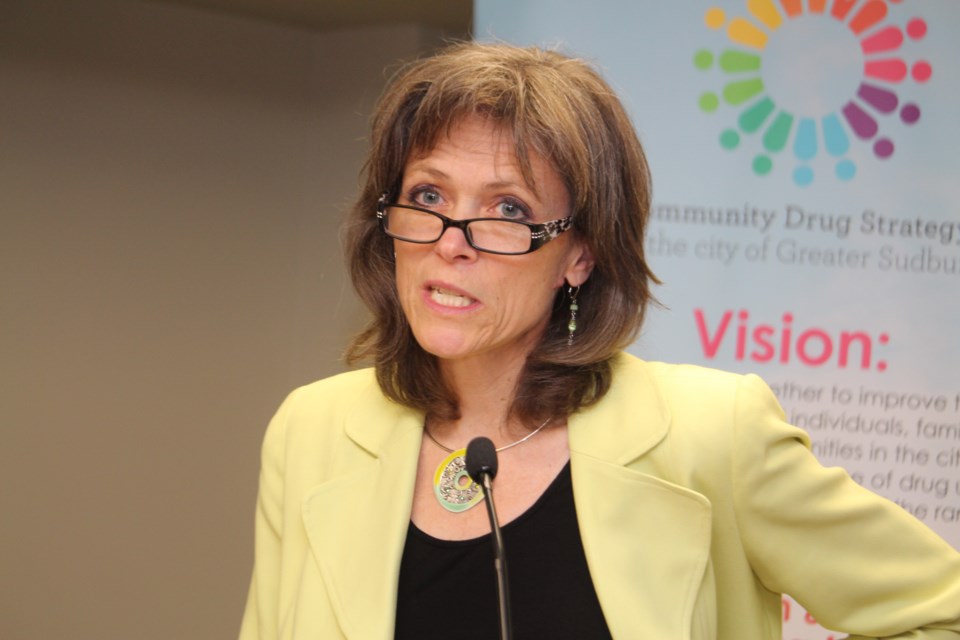Dr. Penny Sutcliffe, the chief medical officer of health for the region and the CEO of Public Health Sudbury & Districts, doesn’t wash or wipe down her groceries when she gets them home, but she says if it makes you feel better to do so, by all means go ahead.
Yes, the virus that causes COVID-19 can live on surfaces for anywhere from a few hours to a few days, depending on the conditions and the surface, but if you’re following directives to wash your hands and avoid touching your face, that’s the best protection, Sutcliffe said this week.
And people should be washing their fruits and vegetables before they eat them anyway, but it’s not necessary to do that in soap and water.
“I do not take additional precautions at home to wash off the pasta box or that kind of thing,” she said. “I do think handwashing is so very important when you’re preparing food, washing counter surfaces … (this is) all very important.
“There’s no harm is wiping down surfaces and containers. There’s no evidence (for it), but if it makes you feel better, there’s no harm.”
Sutcliffe said new information about the SARS-CoV-2 virus is being discovered almost daily, and while the uncertainty surrounding it and the illness it causes are certainly a source of fear and anxiety, she said it is important to know that people as individuals actually have more control than they might think.
There are a lot of unknowns, she said, but taking a deep breath, focusing on the moment and concentrating on what’s in our control can help.
“What is in our control? What can we do? We really have a lot of control over how this virus is spread,” Sutcliffe said.
What are the best things we can do?
“Distance matters, distance matters, distance really matters,” Sudbury’s top doc said.
This means keeping a physical distance between ourselves and others when we’re out and about, but also socially distancing ourselves from gatherings of people. For instance, the Easter and Passover celebrations are this weekend.
Celebrate with your loved ones virtually, Sutcliffe said, using services like Skype or Zoom — don’t celebrate en masse in person.
It means washing your hands — a lot, multiple times a day — and avoiding touching your face.
Proper use of homemade masks and rubber gloves can serve to reinforce the physical barrier we’re keeping between ourselves and others, she said, but it is important to use them properly.
Homemade masks won’t protect you from COVID-19. They’re just not made to catch the droplets the virus is transmitted in. However, homemade masks can catch infected droplets that you expel when breathing and speaking.
And with increasing evidence that there are carriers of SARS-CoV-2 who aren’t showing symptoms, it’s important to follow recommendations and mask up when in places where physical distancing becomes difficult: in grocery stores, pharmacies and the like. This protects those around you from you, should you happen to be carrying the virus.
Tips for mask and glove use from Sutcliffe: don’t touch the front of the mask and if you do, wash or sanitize your hands; after you remove a mask, put it in with your regular laundry, and wash your hands. When taking gloves off, slip your hand inside the glove to remove; don’t pull from the outside. After you remove the gloves, discard and wash your hands.
It’s important to remember “gloves can provide a false sense of security.” The virus can survive on the surface of a glove, just as well as anywhere else. If you’re wearing gloves, don’t touch your face and remember the gloves can carry the virus.
Again, “handwashing is best,” Sutcliffe said.
So far, Northern Ontario hasn’t seen the number of cases that the more populous south has seen. The north’s geography and lower population density certainly helps control the spread of the virus, but COVID-19 has exposed a weakness in the North’s health-care system, Sutcliffe said.
“It’s a blessing and a curse,” she said. “We are somewhat protected … however we also know when the virus is introduced into our communities, and there is spread, we can more easily be overwhelmed, our health care system overwhelmed, our community capacity overwhelmed — those are our absolute concerns.”
This makes it all the more important, she said, to stay home as much as possible, to go out only for essentials, to limit our physical proximity to everyone, including friends and extended family.
This doesn’t mean we have to be cooped up in the house all the time, Sutcliffe said, because that isn’t good for mental health either. Unless you’ve been directed to self-isolate, certainly go out and take a walk, but again, stay at least two metres from anyone you encounter.
This physical distancing doesn’t just protect us, it protects everyone around us, she said. In particular, taking these measures to heart and putting them into practice also protects more vulnerable members of our communities, in particular the elderly.
“They are counting on us (to keep them safe)” by distancing and limiting the spread.
“We are very strong collectively. We will get through this together, and we’ll get through it by taking these very simply, but effective actions of staying home, washing our hands and keeping our distance.”
Watch the full interview below.
